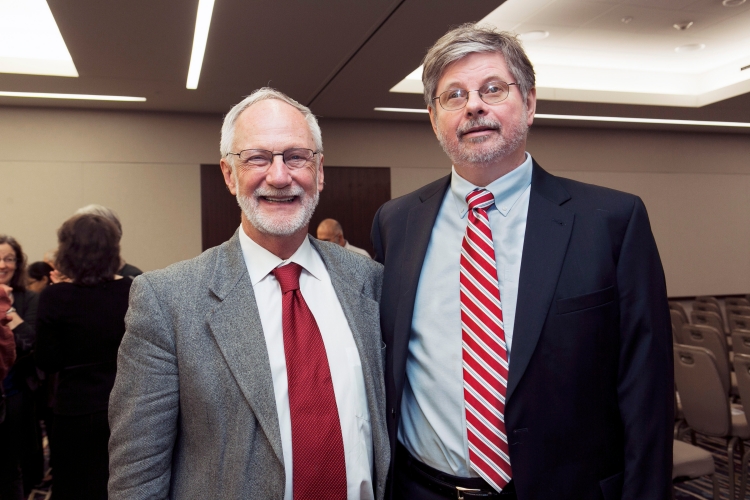
By
Boston College’s innovative National Resource Center for Participant-Directed Services (NRCPDS) is undergoing a major transition this fall, with new leadership and an expansion of its mission to help give individuals and families greater control over the design and delivery of home and community-based services.
Richard Petty, an experienced administrator in advocacy and programs promoting independent community living for persons with disabilities, began his duties as director of the center – housed at the BC School of Social Work – after being appointed this past summer.
He succeeds Professor of Social Work Kevin Mahoney, the founding director and architect of NRCPDS, who will remain as a researcher and oversee the new center initiative focusing on behavioral health, funded by a three-year, $1 million grant from the Robert Wood Johnson Foundation.
The NRCPDS assists states, agencies and organizations in offering participant-directed (PD) services to people with disabilities, including older adults. These services promote independence by helping participants decide for themselves what mix of personal-assistance supports and services best fits their needs. The center – which provides technical assistance, training, education and research – served as the national program office for Cash & Counseling, a successful decade-long effort to introduce PD programs into 15 state Medicaid programs.
In the past decade, according to NRCPDS, the number of PD programs has more than doubled — to almost 300 — as has the number of individuals utilizing PD services and supports, to some 810,000. All states have at least one long-term services and supports program that gives participants the authority to hire, fire and manage their own health care workers; 45 states also allow participants to manage their service budgets. Studies have shown many positive and encouraging results from this approach, the center notes.
“I’ve known Kevin for many years, and thought his work in PD services was groundbreaking and revolutionary,” says Petty, who had been program director at Independent Living Research Utilization (ILRU), a national center advancing community transition programs. “To me, it also said a lot about Boston College that the University supported what Kevin was doing. So the opportunity to come to BC and continue Kevin’s excellent work was a very welcome one.”
“Richard comes with experience and perspectives that will be very valuable as the center expands its outreach to a new, and younger, population,” says Mahoney. “He’s very thoughtful and organized, and he has been on the NRCPDS national advisory committee, so he will be an excellent director for the center.
“I’m excited to start this new phase in my association with the center, by taking on this new multi-state demonstration and evaluation of self-direction in behavioral health,” Mahoney adds.
A native of Arkansas, Petty previously worked at Mainstream, a center for independent living, heading up statewide advocacy efforts, notably home and community services initiatives, and served as a disability lobbyist. At ILRU, based in Houston, he directed national projects that provide training and technical assistance to centers for independent living and statewide independent living councils, which foster community independence for people with disabilities. Petty also led the ILRU Community Living Partnership, of which Mahoney and Boston College were key consultants and experts.
“I became passionate about participant-directed programs from the time I joined Mainstream, in 1988,” says Petty, who earned a bachelor’s degree from Hendricks College in Arkansas and an MBA from the University of Houston’s C.T. Bauer School of Business.
“I would see people who, despite health issues, wanted to live fulfilling lives in their communities but had to stay in care facilities or nursing homes because there were few or no options for supports and services at home. But Cash & Counseling – Arkansas was one of its demonstration states – helped change that.
“Now, you have good, solid scientific evidence – and many success stories -– demonstrating the effectiveness of participant-directed services in helping people achieve their objectives of living in the community.”
Petty and Mahoney believe the PD approach, which has proliferated into aging services and veterans care – the latter includes an NCRPDS initiative to provide PD services-related policy support, training and assistance to the Veterans Administration – will have similar positive outcomes for persons with substance abuse and/or mental health needs, the premise of the new study Mahoney is spearheading. Seven states are participating in the demonstration, which is also being supported through the New York State Health Foundation and the Substance Abuse and Mental Health Services Administration.
“This represents a challenge, in that we are taking the PD model to a different population with different needs – including education, housing and employment – in a different delivery system,” says Mahoney. “But everything we’ve seen leads us to believe that giving persons the autonomy to shape the care and services they need – and ensuring there are resources available to the providers -– will produce the best possible outcome.”
In addition to Mahoney’s project, Petty says, other key areas for the center will include a greater role in the intersection of participant direction and managed care, participant direction for veterans, and research related to participant direction and community integration – especially across disciplines, pointing to a recently begun collaboration with the Connell School of Nursing. He also sees an opportunity for the NRCPDS to address isolation experienced by persons with disabilities or other problems during their transition to community living.
“We find people, even when living in the community, may not feel connected – not going to church, for example, or community events and activities,” he explains. “That is my next passion: How to support better integration and inclusion for this population.”
For more on the National Resource Center for Participant-Directed Services, see www.bc.edu/nrcpds.



